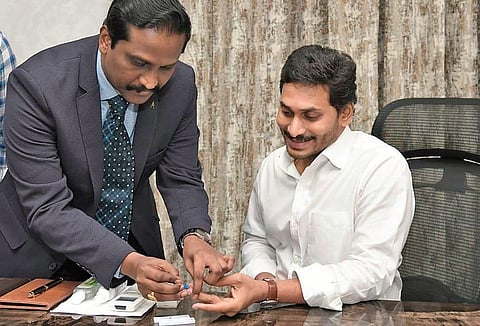

VIJAYAWADA: In a move set to ramp up community screening for Covid-19 in Andhra Pradesh, the state on Friday received one lakh Rapid Diagnostic Test (RDT) kits from South Korea. These kits will help identify the presence of IgG and IgM antibodies within 10-15 minutes. The kits were unveiled by Chief Minister YS Jagan Mohan Reddy, and the first test in the state was conducted on him. The result returned negative.
“The CM has given his specimen to send across a message that people can get tested without any apprehensions. If anybody tests positive, they don’t need to panic as we have a good team of doctors and healthcare workers at Covid-19 hospitals and quarantine centres,” said Dr Rambabu, who conducted the test. According to the Chief Minister’s Office, Andhra Pradesh is the first state in India to have imported RDT kits from South Korea. They were manufactured by Seoul-based firm SD Biosensor Inc and presented to the Chief Minister by the company’s Indian partner Sandor Medicaids Pvt Ltd.
As of Thursday, AP conducted 331 tests per million people, and stood fourth in the country in terms of the extent of testing. The top three spots were taken by Rajasthan (549), Kerala (485) and Maharashtra (446). With the RDT kits, the number of tests conducted in AP is expected to shoot up from 2,200 to 10,000 per day. The kits were brought to Vijayawada from Hyderabad by road, and will be sent to all AP districts within three days. They reached Hyderabad via New Delhi from South Korea on a special flight. “RDT kits will be used for community testing in city clusters where there are many cases, for symptomatic cases identified in the fever survey, and in high-incidence clusters in Krishna, Guntur, Kurnool, Prakasam, Nellore and Kadapa districts,” an official said.
Community screening for COVID-19 to be ramped up as 1L test kits arrive
However, results from the RDT kits, which have been approved by the Indian Council of Medical Research (ICMR), are not confirmatory in nature. If the antibody test result returns positive for coronavirus, the sample will again be tested using the reverse transcription polymerase chain reaction (RT-PCR) method in a laboratory. The health department aims to conduct up to 15 lakh tests of various types, such as RT-PCR, Truenat PCR and RDT antibody tests, in the next 28 days based on the risk profile of the clusters.
“This also depends on when we get the ordered Truenat and remaining RDT kits,” said an official, adding, “But if we get the kits as planned in the next four weeks, we would be able to do over 50,000 tests a day, and the number of tests per million would shoot up to 1,000.” Virus Research and Diagnostic Laboratory (VRDL) swab tests would be conducted on high-risk persons within containment clusters, while Truenat/modified PCR/clia tests (intravenous blood) would be done on moderate-risk persons in containment clusters with mild symptoms and those in quarantine centres. RDT tests will be done on those who seem to be at a low risk (asymptomatic) and others.
“We planned to do 79,025 tests this week, and have done about 17,600 so far. Since the RDT kits have arrived, we will exceed the target,” the official said. The health department has already started training staff on how to perform the rapid tests. However, officials pointed out that RDT kits can only detect antibodies a few days after one has contracted the virus. “A negative doesn’t mean you are not infected. It means antibodies are not present at the time of testing. Hence, we planned the testing strategically so we don’t use the available kits at random,” another senior official observed.